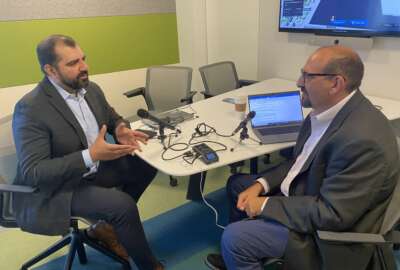Hubbard Radio Washington DC, LLC. All rights reserved. This website is not intended for users located within the European Economic Area.
Why the General Services Administration has a busy year coming up
An acting commissioner for the Federal Acquisition Services. Two governmentwide acquisition contracts to be awarded and a third launched. Dealing with the FBI r...
An acting commissioner for the Federal Acquisition Services. Two governmentwide acquisition contracts to be awarded and a third launched. Dealing with the FBI relocation mess. The General Services Administration you might say, has a lot on its plate. To dive deeper into what contractors are watching, the Federal Drive with Tom Temin spoke with federal sales and marketing consultant Larry Allen.
Interview Transcript:
Larry Allen And Tom, Sonny Hashmi, who’s been the commissioner of the Federal Acquisition Service for the last almost three years. And Sonny has done a great job with the strategic view of the Federal Acquisition Service. He’s certainly tried to implement some things that will make the service be more efficient. One of the things most recently is the FAS reorganization plan that just kicked off about a couple of months ago. So great stuff there trying to make the organization as a whole more transparent. He started the Dead Easy campaign at GSA to make it dead easy for people to do business with the Federal Acquisition Service. And he’s put in his time, before this he was CIO with another agency in a previous administration. So he’s been a great public servant with a good record of service. And everybody wishes him well on the private sector. And I’m sure none of us have seen the last of him. In the meantime, he is turning over a federal acquisition service that has one or two challenges coming up in the immediate year. And that’s going to be something that the acting commissioner, Tom Howder, has to work on.
Tom Temin Right. Tom Howder will be, I guess, acting commissioner. And there’s not quite the flexibility to act as acting as you can when you actually have the permanent role. But the awarding of two of the big contracts, I think is going to really be important, especially since they’ve been so delayed by protests. Tell us more about that one.
Larry Allen So what we’re expecting in 2024, Tom, is the award of the OASIS plus contract for a full range of professional services. This would be the follow on to GSA’s wildly popular OASIS contract. OASIS plus is going to be substantially bigger, both in terms of scope and in number of contractors. The second contract coming up in 2024 should be the Polaris contract, which is GSA, Small Business, IT solutions contract. And that one in particular, Tom, has been beset by protests. In fact, Polaris itself grew out of a previous program that crashed and burned because of protests. So right now, GSA is in the process of asking the original offers to make various updates to their offers based on protest decisions. And I think we’ll have those offers analyzed and hopefully awards will come out in 2024. I’m sure there will be some protests on the award, no award decisions, but we’re kind of now in the contracting red zone, if you will, on Polaris. So close enough, hopefully to make it happen.
Tom Temin And then Alliant Three is something you’re saying could be put out for bid in the coming months. And that’s going to be interesting because Polaris and Oasis Plus got a lot of protest at the solicitation stage and we don’t know about yet the award stage, but it’s the solicitation stage that got these things So off course. Could that happen with Alliant Three?
Larry Allen It absolutely could happen with Alliant Three, Tom. Alliant Three will be GSA’s major IT government wide acquisition contract for all kinds of solutions. The Alliant Two program has been phenomenally successful. Everything points to Alliant Three just building on that success. But, as you point out, they’ve got to do the 110 protest hurdles. Let’s hope it’s not 110 picked up because 110 meters, but they’re going to have to go through the protest hurdle. I think that we’re going to see protests on any type of IDIQ contract, Tom. Over the issue of how you score past performance on protege agreements or JV’s, even contractor teams. That seems to be an issue where there is some ambiguity now. I know that, not just GSA, but [National Institute of Health (NIH)], for example, is trying to nail that one down. I think we’ll eventually get there with a series of rulings that set up case law. But Alliant Three, which is on a very tight timeframe to get out the door, probably will see some pre-award protests and inevitably proposed award. But they’re doing the right thing. The Alliant Three team, they just recently came out with a second draft RFP for people to comment on. So if you take a look at it, you have comments. I would urge people to do that. And if you take a look at Alliant Three in its draft stage and say, hey, this is going to be a stretch for us, there may be no way we can really participate as a prime. That’s fine. There’s a lot of ways to do business on Alliant Three and other GWAC contracts as a subcontractor, as a partner. It’s not something that you can do right now to reach. Please don’t protest it just because it’s a reach. Look for other ways to access your government customer.
Tom Temin We’re speaking with Larry Allen. He’s president of Allen Federal Business Partners. And then this is not going away, though, is the mess and the tangle that the awarding of the FBI headquarters decision to put it in Greenbelt, Maryland. Now, that’s all tied up, IG report coming, which doesn’t necessarily stop the decision, but maybe effectively it will. And this is going to take GSA probably throughout 2024 to resolve, I’m thinking.
Larry Allen Tom, I think you’re absolutely right. And while this isn’t a classic Federal Acquisition Service issue, it is certainly is one for GSA overall and it’s one that is going to be in the headlines. It’s going to be top of mind for the congressional oversight committees. We’ve already had a couple of congressional hearings that have either focused or touched on this topic of the FBI relocation. You pointed out we’re going to have an IG review right now. So this is something that’s going to tangle up the senior leadership at GSA, along with the other public building service issues like telework, not just for GSA, but for all government agencies. And what that means in relation to GSA is federal office space portfolio. So whether it’s this specific FBI office, that certainly is going to take up a lot of political capital and a lot of time of senior management or the telework issue, we’re talking about people on the administrators office focusing a lot on these things, not so much on acquisition and procurement.
Tom Temin Yes. And the whole issue of telework and what should the federal real estate bulk be? How much space should the government actually be leasing here? Or can they consolidate agencies into existing federally owned building? These questions don’t seem to be anywhere near resolved, and it’s almost like you have an irresistible force that is the administration wanting people to come back into the office, reaching an immovable object, which is people like teleworking, and they’re not about to give it up. I see that as a low level simmer again for another year.
Larry Allen Tom, I think you’re exactly right. And as far as GSA is concerned, not all of these variables, of course, are within GSA’s control. They can manage the office space, they can negotiate the leases, they can manage their workforce. But other agency workforces are going to have to be driven by their senior leadership. And there is going to be the tension there. I can’t imagine why anybody would mind being in a slug line at Woodbridge, Virginia, at 5:00 in the morning. And, it’s a great way to meet new people and see a beautiful part of the country way before the sun comes up.
Tom Temin Right. But you can’t smoke in the car if you’re a slug line passenger. And that could really be a setback for some people. But yeah, I mean, everyone acknowledges the traffic in the DMV has returned to even worse than it seen before the pandemic. Nobody knows why, but that’s just one of those universal constants. And finally, there is the fact that 2024 is an election year. So transition is GSA’s big business operation. When there is a transition, if there’s a transition, a new administration, we don’t know yet, but that’s got to start taking some cycles in their thinking also.
Larry Allen Tom, it absolutely does. And what GSA has to do, and what they do every time there’s an election, is they set up a transition office for each major party candidate so that that candidate has the office space, it has the supplies, it has the phone lines, it has the IT connections, whatever it is that group might need to get its work done. So even if there’s someone way ahead in the polls, GSA is obligated to make sure that they have two transition offices up and ready to go to help that transition take place after the election. It’s a little bit less of a pull if you’ve got the incumbent that wins reelection, but it’s a lot more if you’ve got somebody new coming in to the office. And that takes up all of GSA. It’s not just space that the public building service does. It’s furniture, it’s IT, it’s support. All of the things that the Federal Acquisition Service does as well. And it’s not a lot of stuff that people outside of the agency see, Tom. But if you’re in one of the major campaigns or if you’re in GSA, you know that the closer we get to election Tom, the more resources these operations take up.
Copyright © 2024 Federal News Network. All rights reserved. This website is not intended for users located within the European Economic Area.
Tom Temin
Tom Temin is host of the Federal Drive and has been providing insight on federal technology and management issues for more than 30 years.
Follow @tteminWFED
Related Stories
Is GSA’s Alliant 3 vehicle tilted too much to small, very large contractors?
Related Stories
-
Is GSA’s Alliant 3 vehicle tilted too much to small, very large contractors? Reporter's Notebook
-
GSA’s Hashmi leaving at end of the month Contracting





